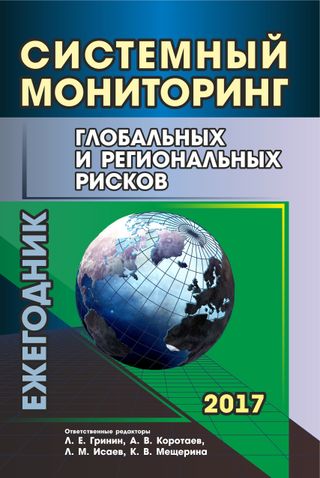?
Центральная Азия. Риски транзита в стареющих режимах
Гл. 7. С. 186–202.
Keywords: политические рискиЦентральная Азияпостсоветское пространствоpost-Soviet countriesCentral AsiaСредняя Азияполитические режимытранзитpolitical regimesPost Soviet statespolitical risksMiddle Asiapower transittransfer of powerтрансфер властитранзит властиageing political regimes
Publication based on the results of:
Тебин П. Ю., Russia in Global Affairs 2026 Vol. 24 No. 1 P. 134–148
This article contends that, in the context of growing, multifaceted, and long-term great-power competition, Russian national security depends upon developing a Eurasian transport network through a cohesive ‘whole-of-government’ approach. Such a network includes robust domestic infrastructure as well as a diversified and resilient network of international transport corridors, foremost the International North-South Transport Corridor (INSTC) ...
Added: January 12, 2026
Ташкент: Ma’rifat, 2025.
В монографии на основе глубокого изучения и анализа источников и научной литературы освещаются коммуникационные процессы в регионах Северной и Центральной Азии, как общие, так и специфические. Монография, расчитаная на широкий круг читателей, подготовлена коллективом авторов и является результатом совместной работы узбекистанских и российских ученых в рамках деятельности Консорциума исследователей истории стран Северной и Центральной Азии. ...
Added: November 28, 2025
А.В. Коротаев, В.В. Устюжанин, Ю.В. Зинькина et al., История и современность 2025 № 3 С. 21–68
The article examines the trends affecting state activity and sustainability in the countries of the Afro-Asian macro-stability zone, which are considered in the context of the transformation of the world order and the associated process of reconfiguration of the World System. An attempt has been made to use the concept of state solvency to build ...
Added: November 27, 2025
Rasell M., Phillips S., Elena Iarskaia Smirnova, Children and Youth Services Review 2025 Vol. 178 Article 108488
Promoting the inclusion, rights and participation of diverse young people is a global policy and practice challenge. With children often positioned as ‘objects’ of care in adult-led government systems of social services, childhood is a field rife with exclusion, discrimination and inequality driven by economic, social, cultural and political forces. Processes of globalisation drive the ...
Added: September 3, 2025
Arzhantseva I., , in: Environmental Humanities in Central Asia. Relations Between Extraction and Interdependence.: L., NY: Routledge, 2023. P. 149–174.
The chapter is devoted to the water policy of the Soviet Union in Central Asia and the participation of archaeologists and ethnographers in it. ...
Added: July 1, 2025
Maria А. Bultseva, Berberyan A., Sonia A. Berrios Callejas, RUDN Journal of Psychology and Pedagogics 2024 Vol. 21 No. 2 P. 408–426
Russians are one of the largest ethnocultural minorities in the post-Soviet and the issue of their inclusion in the societies of host countries remains relevant. Therefore, this study was focused on the relationship between perceived security and social identities (civic, ethnic or European) and the perceived permeability of social boundaries for Russians in Armenia, Kazakhstan, ...
Added: June 11, 2025
Vladimir B., Современная Европа 2025 № 2(130) С. 65–78
Thе article examines the specifics of the EU countries’ practices of insuring foreign investment from political risks through the lens of international development agenda. It consecutively identifies the institutional aspects of relevant activities, objectives and conditions of foreign investment insurance or guarantees, scale and geographical scope of coverage, as well as the trends that have ...
Added: May 14, 2025
Bordachev T., Тебин П. Ю., Россия в глобальной политике 2025 Т. 23 № 3 С. 164–180
Период совместного развития России и народов Центральной Азии сначала в составе Российской империи, а затем СССР уходит всё дальше в историю. Задачей российской политики в регионе становится выстраивание полноценных межгосударственных отношений. Вопрос не в формальном взаимном признании независимости и уважении национальных интересов, а в осознании друг друга самостоятельными участниками международной политики, что накладывает на обе ...
Added: May 5, 2025
Задорин И. В., Maltseva D., Молоткова О. А., Полития: Анализ. Хроника. Прогноз 2024 № 4(115) С. 163–186
Difficult and controversial, with setbacks, the process of reintegration of the CIS countries is largely failing in the humanitarian sphere. Humanitarian communications in the field of education, science, culture, art, etc. have long remained on the periphery of the attention of political elites of the new independent states, or the elites even deliberately hampered them. ...
Added: April 10, 2025
Никонов И. В., Арустамян М. Г., Mukhametov O. et al., Финансовый журнал 2024 Т. 16 № 5 С. 8–26
The rapid growth of public debt in developing countries in recent years and the increasing risks associated with this process emphasize the importance of research in this area. The article examines one of the key aspects of public debt management — the structure of creditors’ debt portfolio. The object of the study is the public ...
Added: April 6, 2025
Никонов И. В., Radionov S., Mukhametov O., Экономический журнал Высшей школы экономики 2023 Т. 27 № 4 С. 550–573
One of the global macroeconomic trends of recent years is the increase of public debt by many developed and developing countries. The global cycle of interest rate hikes that began in 2021 poses risks to debt sustainability, especially in developing countries. These trends predetermine the growing relevance of research in the field of public debt ...
Added: April 6, 2025
